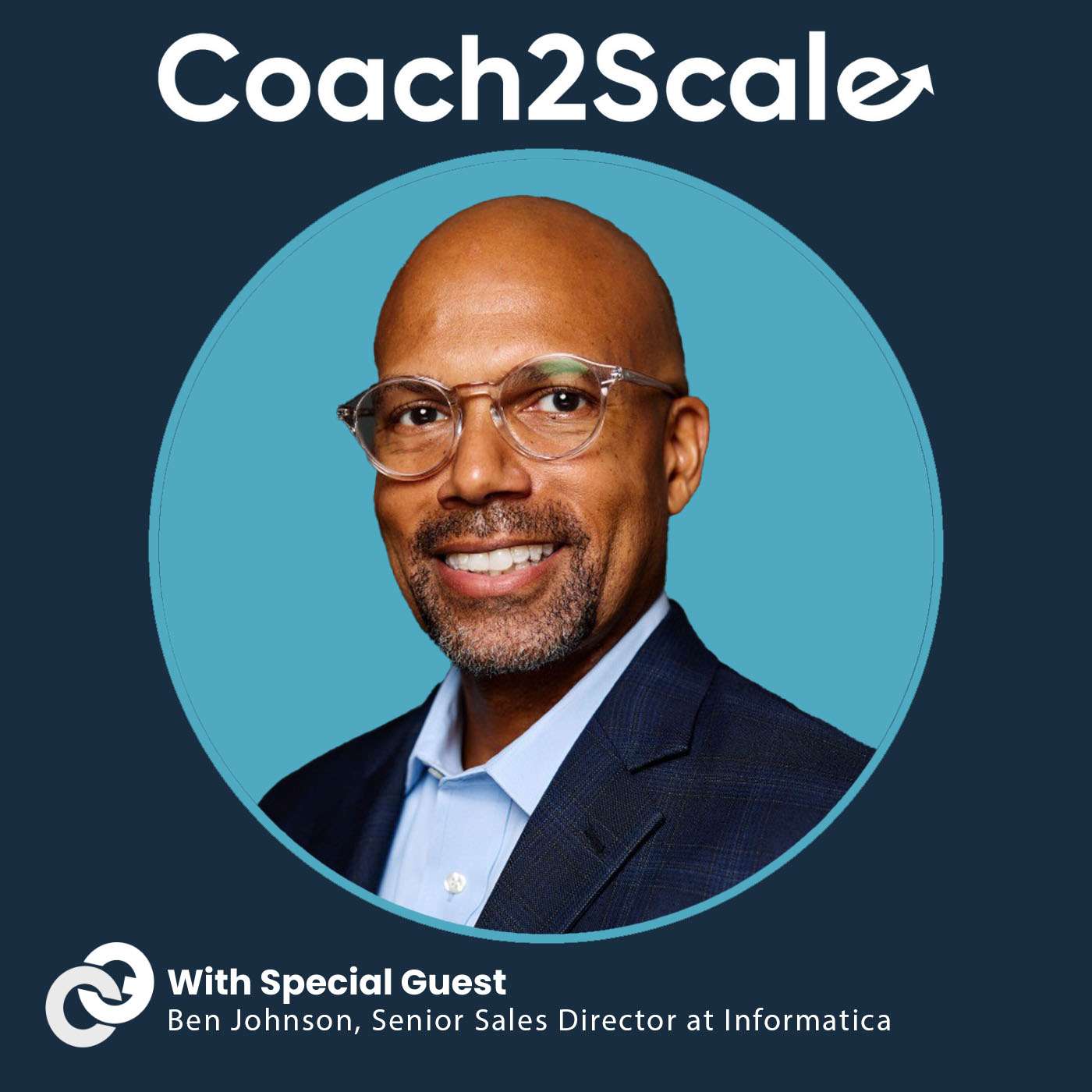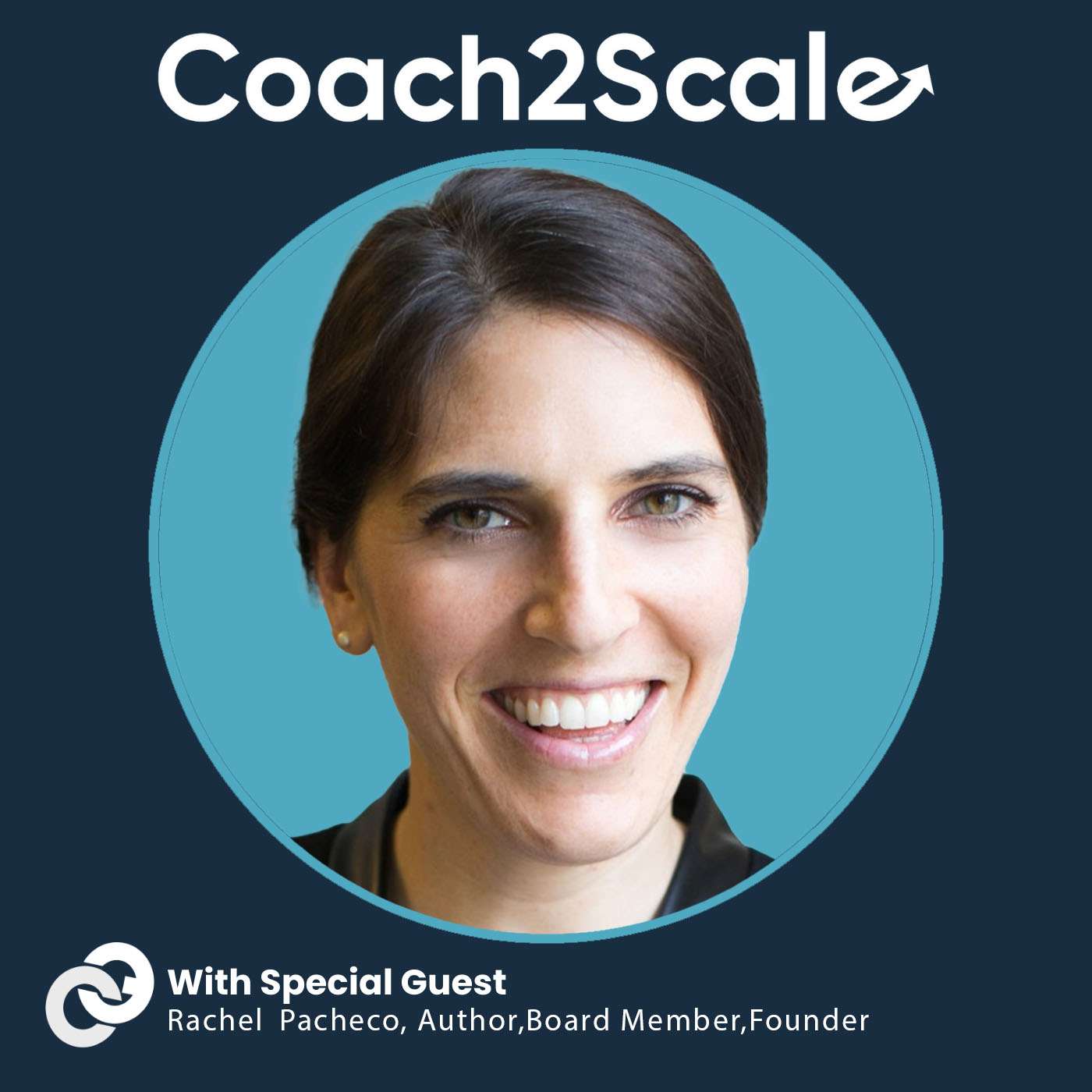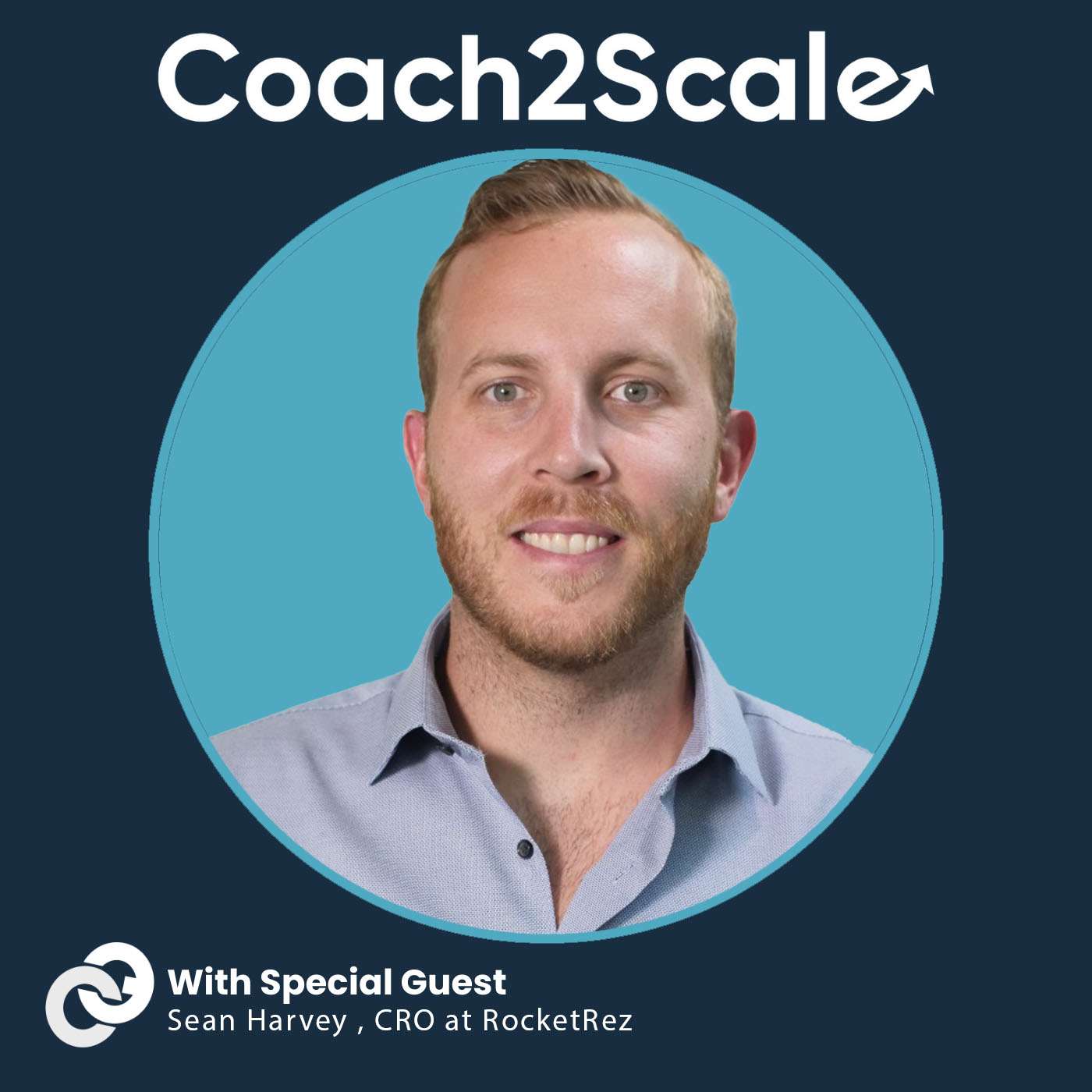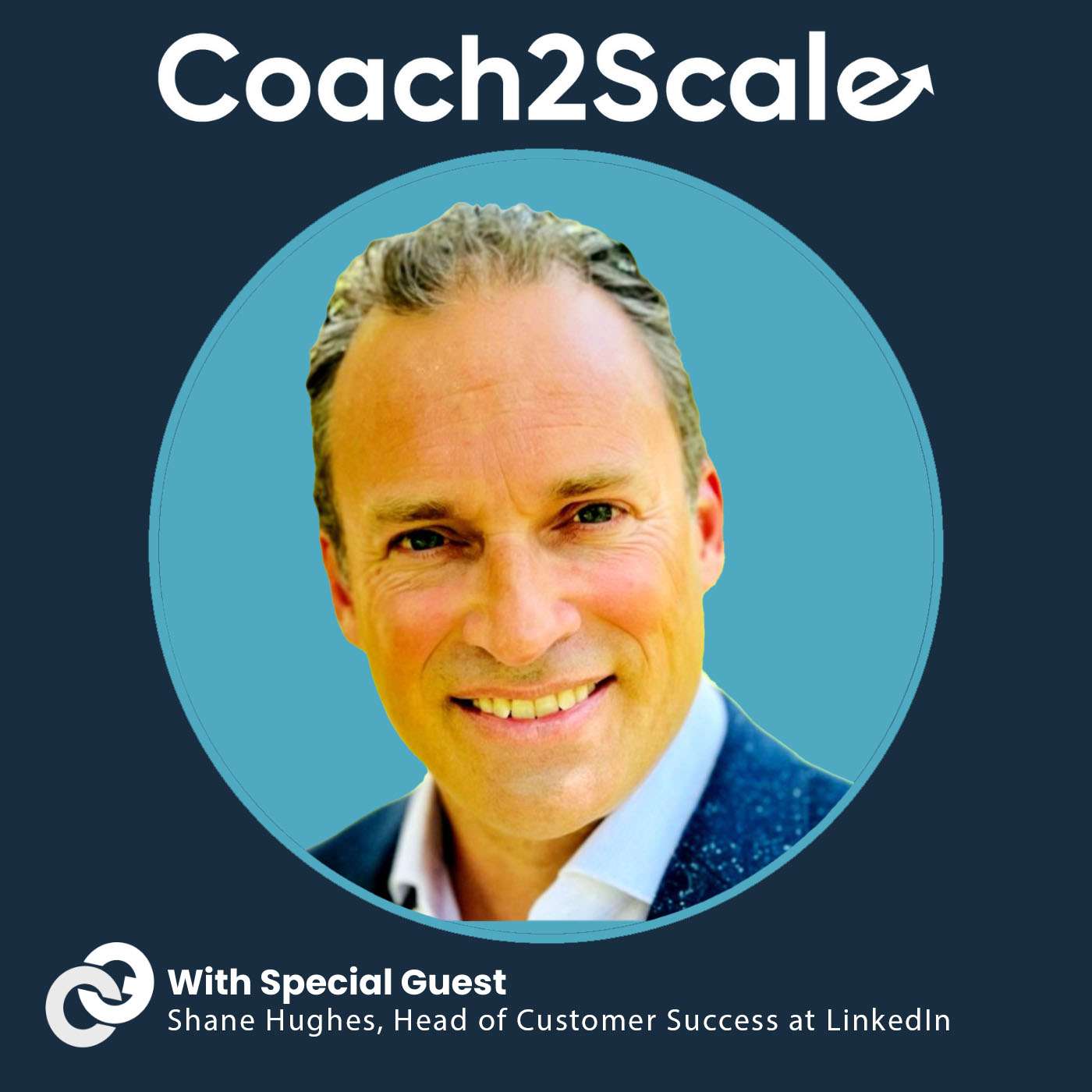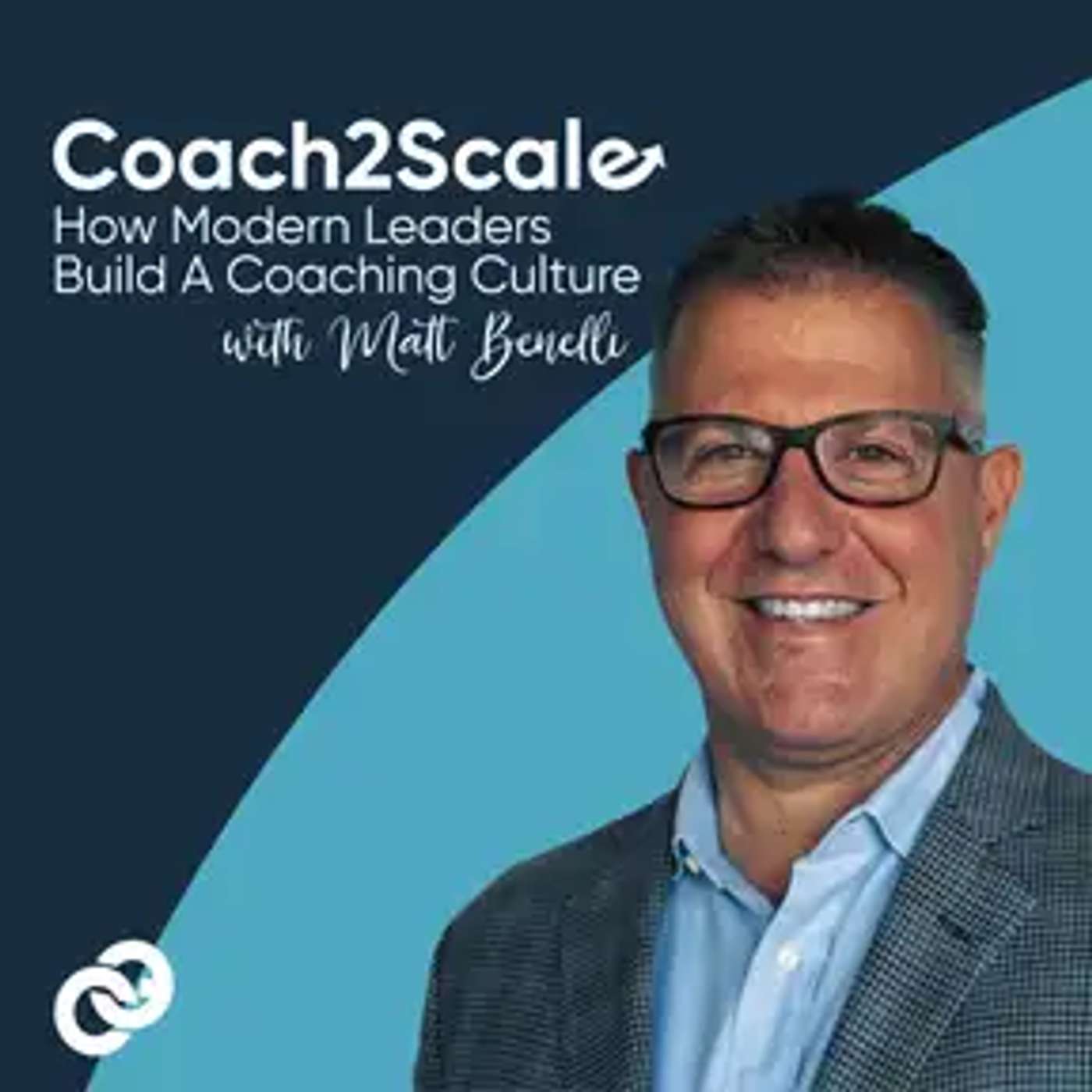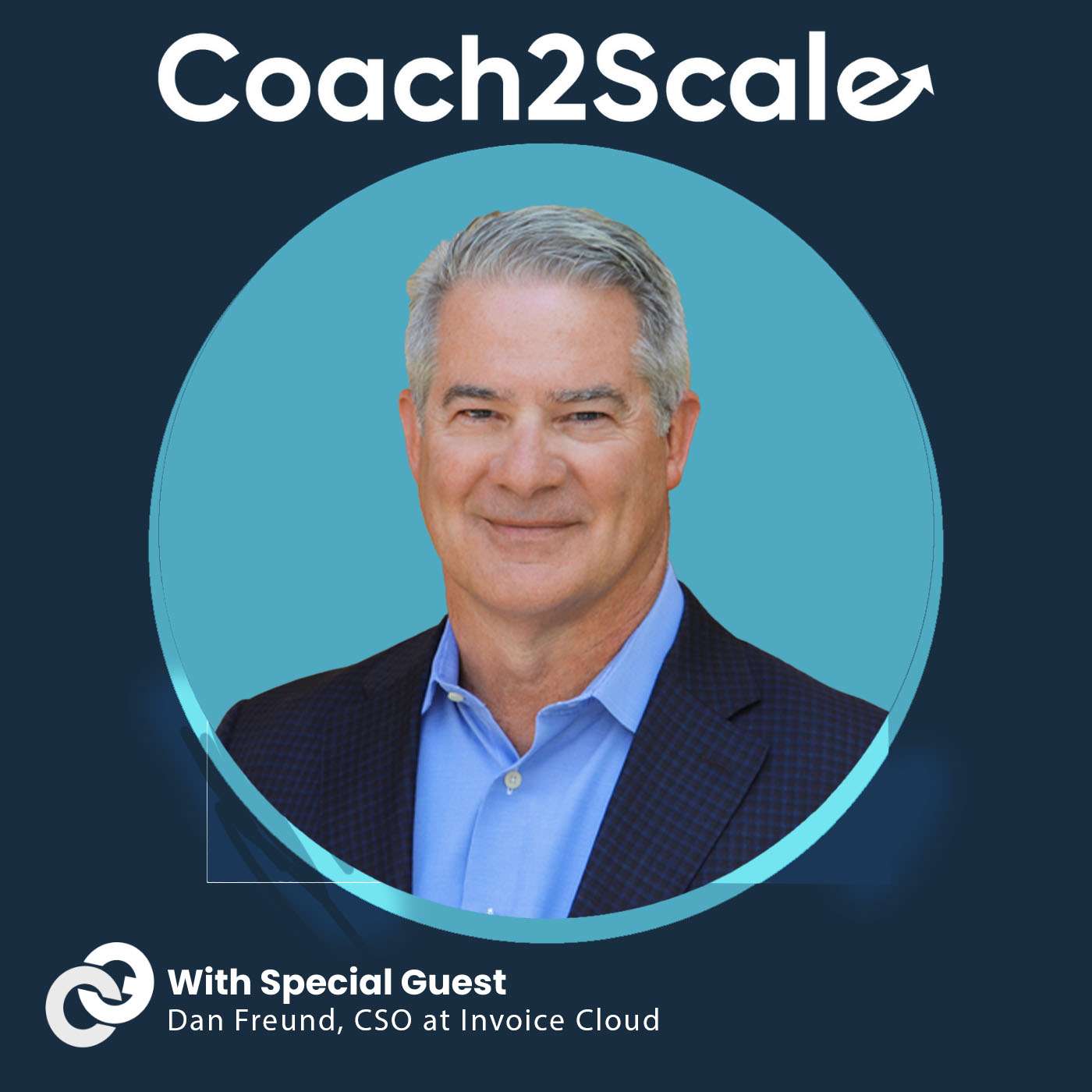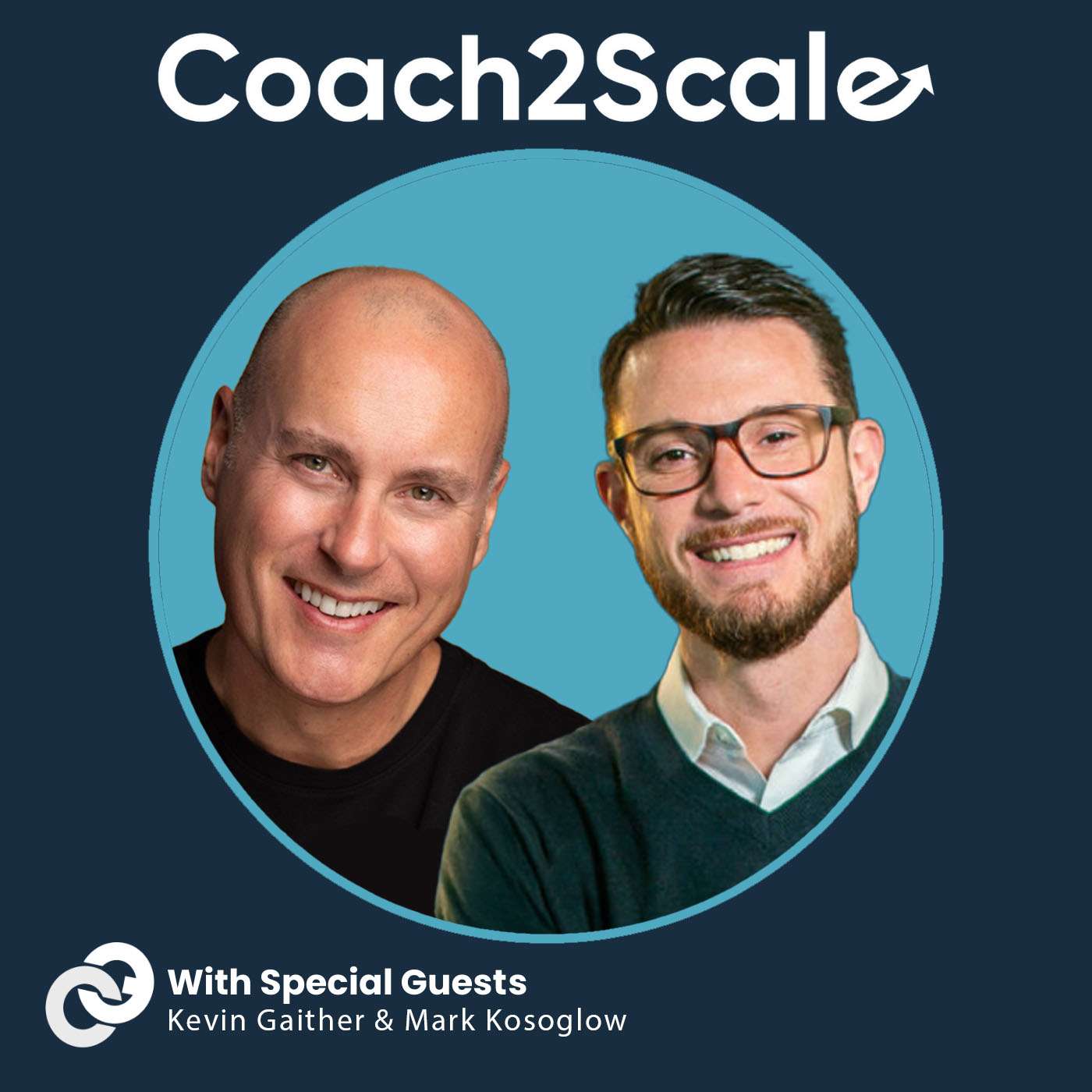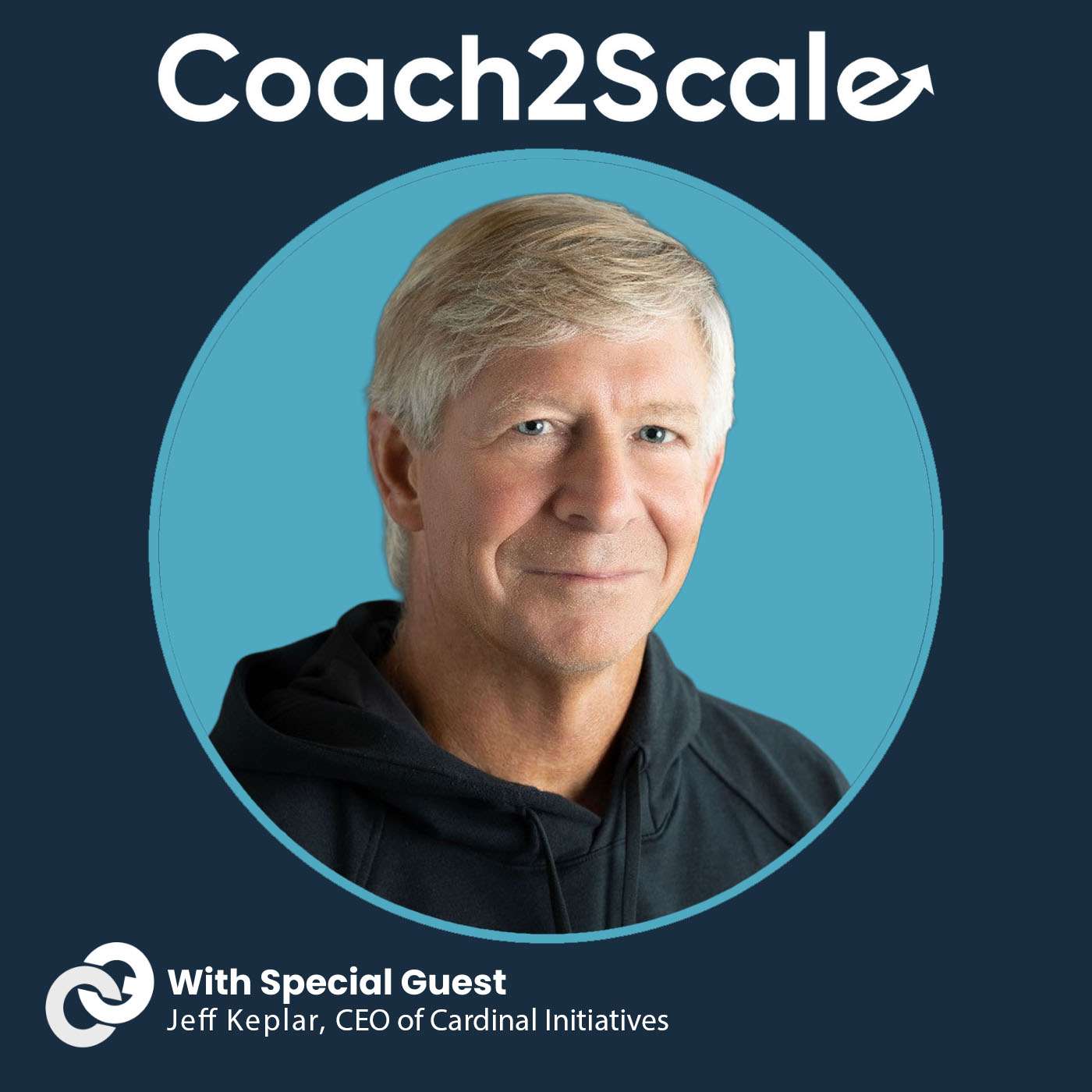Discover Coach2Scale: How Modern Leaders Build A Coaching Culture
Coach2Scale: How Modern Leaders Build A Coaching Culture

Coach2Scale: How Modern Leaders Build A Coaching Culture
Author: CoachEm
Subscribed: 3Played: 173Subscribe
Share
© CoachEm
Description
Welcome to Coach2Scale - How Modern Leaders Build Coaching Cultures
Join Host Matt Benelli for conversations with management professionals in B2B companies who share the belief that effective coaching improves the performance of every team member. Our mission is to help leaders become better coaches.
Coach to Scale is sponsored by CoachEm, the world's first AI coaching execution platform that leverages evidence-based coaching to increase quota attainment.
Join Host Matt Benelli for conversations with management professionals in B2B companies who share the belief that effective coaching improves the performance of every team member. Our mission is to help leaders become better coaches.
Coach to Scale is sponsored by CoachEm, the world's first AI coaching execution platform that leverages evidence-based coaching to increase quota attainment.
110 Episodes
Reverse
In this replay episode of Coach to Scale, host Matt Bonelli sits down with Ben Johnson, VP at Zendesk, seasoned sales leader, and longtime CrossFit coach, to explore what it really takes to build a thriving sales career. Drawing on more than 25 years of experience at companies like Dell, Oracle, Workday, and Zuora, Ben challenges the myth that sales success is measured only by the quarter. Instead, he shares why the true differentiator is consistent coaching, a culture of accountability, and the willingness to sharpen your sword through personal development.Listeners will walk away with actionable insights on transforming performance improvement plans into coaching opportunities, creating cultures where vulnerability is strength, and distinguishing between “must-dos” and “how-tos” in sales leadership. From rebranding coaching as a growth engine to embracing “deeds, not words,” this conversation delivers timeless lessons for sales reps, managers, and leaders who want to play the long game and win.Key Takeaways1. Coach to the career, not the quota – Long-term success comes from developing people beyond just hitting short-term numbers.2. Performance Improvement Plans can be growth tools – When used correctly, PIPs should guide reps toward improvement, not serve as a punishment.3. Coachability is the key to success – The most successful reps are those open to feedback, willing to adapt, and eager to learn.4. Culture starts at the top – A strong coaching culture must be modeled by leadership and reinforced consistently across the organization.5. Preparation and debriefing matter as much as the meeting – Success comes from doing the pre-work, running the meeting, and reflecting afterward to continually improve.6. Focus on “must-dos” vs. “how-tos” – Clear expectations around the basics (like CRM hygiene) free up time to coach on higher-value selling skills.7. Deeds, not words – Accountability is proven through consistent actions, not promises.8. Get the bad news early – Addressing risks and challenges upfront allows teams to respond effectively instead of scrambling at the last minute.9. Invest in personal development – Ongoing learning, mentorship, and self-improvement are essential to staying sharp and thriving in sales.10. Find mentors and be one – Having someone to guide you (and paying it forward to others) accelerates growth and resilience in a sales career.
In this episode of Coach2Scale, author, professor, and board advisor Rachel Pacheco joins host Matt Bonelli to unpack one of the most overlooked drivers of sales performance: meaning. Drawing from her research and experience working with fast-scaling startups and MBA students alike, Rachel challenges the myth that salespeople are only motivated by money or perks. Instead, she shows why helping reps find purpose in their day-to-day work leads to deeper engagement, higher productivity, and better retention, and why frontline managers have the greatest influence over that outcome.You’ll hear practical ways to coach for meaning, how to deliver feedback that builds self-awareness and performance, and why micromanagement isn’t the real problem, meaninglessness is. Rachel shares coaching tactics for time-strapped managers, explains the risks of cookie-cutter motivation strategies, and outlines how structured 1:1s can become high-trust development conversations. Whether you're a CRO, frontline manager, or enablement leader, this episode will help you rethink how to build a culture where performance and purpose go hand-in-hand.Key Takeaways1. Meaning is a daily experience, not a grand purpose.Most employees aren't searching for their “life’s purpose” at work; they’re looking for day-to-day meaning in their tasks, interactions, and progress.2. Managers play a central role in helping reps find meaning.It's a myth that meaning is personal and out of a manager’s scope; the way managers structure work, give feedback, and coach reps directly influences how meaningful their work feels.3. Productivity increases when reps experience more meaning.Research, including studies by Adam Grant, shows that employees who understand the why behind their work are not only more engaged but also more productive and resilient.4. Motivation is personal and needs to be customized.Not all reps are driven by competition or money; some value connection, stability, or mastery, and managers must learn what uniquely drives each individual.5. Great coaching starts with structured autonomy.Managers should set clear expectations and outcomes, then give reps the space to figure out the “how”; this autonomy fosters ownership, trust, and greater meaning.6. Effective feedback is specific, timely, and impact-driven.Generic praise (“Great job!”) is forgettable; meaningful feedback highlights what was done well, why it mattered, and how it helped the team or business.7. Constructive feedback is a growth opportunity, not a threat.Most employees want more feedback, even the tough kind, but managers often avoid it due to discomfort, missing critical chances to drive behavior change.8. Curiosity is a manager’s superpower.Asking thoughtful questions helps uncover what motivates each rep, what’s holding them back, and how to connect daily work to a more profound sense of purpose.9. Coaching isn’t about giving answers; it’s about guiding reflection.Coaching helps reps build self-awareness, clarify decisions, and reflect on their growth; it’s less about solving problems and more about building capability.10. Don’t wait for better managers; teach your current ones how to coach.Many frontline managers were promoted without training; they don’t lack intent, they lack tools. Organizations must invest in teaching them how to lead through coaching.
In this episode, Sean Harvey, CRO at RocketRez, shares a practical framework for building coaching cultures that actually stick. He explains why trust, not tactics, is the starting point for real performance, and how coaching must move beyond pipeline reviews and into intentional skill development. From his early Oracle training to leading teams through hypergrowth and private equity scale-ups, Sean outlines the lessons that shaped his belief in coaching as both a performance lever and a retention strategy.If you’re still coaching “on the fly” or stuck playing super-rep, this conversation will challenge your assumptions. Sean covers the link between psychological safety and rep engagement, how vulnerability-based trust unlocks real development, and why sustainable growth demands coaching at every level from C-suite to the frontlines. You’ll walk away with a clearer understanding of what coaching is, what it’s not, and how to build a team that stays, grows, and performs.Key Takeaways1. Coaching must start at the top to stick long-termIf the C-suite doesn’t model and prioritize coaching, it gets deprioritized the moment short-term pressure hits.2. Trust is the foundation of any real coaching cultureReps won't grow unless they believe their manager has their long-term development, not just this quarter’s numbers, in mind.3. Vulnerability-based trust drives engagement and learning.Creating psychologically safe spaces where reps can fail and learn openly is what unlocks real skill development.4. Great managers coach people, not just deals.Coaching isn’t about saving deals; it’s about building reps who can consistently win without constant intervention.5. Consistency matters more than intensity.A lightweight but regular coaching rhythm beats sporadic “inspiration bursts” that vanish under pressure.6. You can’t scale if you’re only hiring more reps.Scalability means increasing productivity per rep, which only happens when you build coaching into the operating system.7. Coaching drives retention, especially in high-talent environmentsReps stay where they feel invested in, especially when they’re being challenged to grow with structure and support.8. Managers are overwhelmed and under-equipped to coachMost FLMs were promoted as top reps but were never taught how to develop others; tools and frameworks help close this gap.9. The best leaders have coaching “trees”Just like in sports, great coaches produce other great coaches; mentoring others to lead is a force multiplier.10. Success is compounding when coaching becomes cultureWhen coaching becomes normalized, teams get better, faster, improving not just results, but predictability.
In this special episode of Coach to Scale, host Matt Benelli takes on a bold challenge: a live cold-call role play with Hyperbound’s AI-powered prospecting bot one of the “rudest bots on the planet.” Joined by Hyperbound co-founder and CEO Sriharsha Guduguntla, Matt puts his skills to the test, showcasing how sales reps can practice real-world scenarios, handle objections, and refine their pitch with real-time coaching. The result? A raw, unfiltered look at what happens when the pressure is on and every word counts.Listeners will walk away with insights into effective prospecting, the power of permission-based openers, handling resistance with confidence, and how instant AI feedback can accelerate coaching and skill development. Whether you’re a sales leader, manager, or rep looking to sharpen your edge, this episode delivers a front-row seat to practical techniques, lessons learned, and a clear takeaway: you don’t have to love cold calling you just need to practice, improve, and get better every time.Key Takeaways1. Practice under pressure matters – Putting yourself in tough role plays with AI bots helps reps simulate real-world challenges and improve faster than passive learning.2. Instant feedback accelerates growth – AI delivers coaching in real time with detailed scoring criteria, so reps don’t have to wait for a manager’s one-on-one to learn what to improve.3. Consistency beats comfort – You don’t need to love cold calling, but consistent practice builds confidence and competence over time4. Three types of prospectors – Some salespeople thrive on cold calls, some avoid them but claim they do, and managers often love them because they don’t have to make them anymore, recognizing this helps leaders coach more effectively5. Objection handling is a teachable skill – With structured practice and coaching, reps can learn to confidently navigate push back and still secure meetings6. AI empowers both reps and managers – By offloading repetitive role plays and providing objective coaching, managers can spend more time on strategy while reps still get valuable development.7. Anyone can try it – Hyperbound makes its prospecting bots publicly available so sales professionals can test themselves, practice as often as they want, and benchmark improvement
Scaling teams inside matrixed organizations is rarely about speed alone. Shane Hughes, Head of Customer Success at LinkedIn and former Salesforce executive, argues that real growth comes from slowing down to coach with intention, aligning stakeholders early, and focusing relentlessly on customer value. In this conversation, he shares how leaders can avoid the trap of “chasing renewals” and instead build advocacy from the start by connecting adoption to measurable business outcomes.Shane also pulls from his experience leading teams that grew revenue from millions to billions to highlight what separates managers from true coaches. He explains why curiosity is the foundation of influence, how consistency compounds impact, and why high performers act more like consultants than communicators. Whether you’re a CRO, frontline manager, or rep aiming to lead, his lessons offer a clear path to scaling without losing your edge.Key Takeaways1. Renewals are won early, not saved late – Retention isn’t about heroics at the end of a contract; it’s about shaping value in the first months after a deal closes.2. Adoption does not equal value – Usage is necessary but meaningless unless it connects to the customer’s defined business outcomes.3. Curiosity drives advocacy – The best customer success leaders don’t just communicate; they ask sharp questions that reframe problems and uncover hidden opportunities.4. Coaching beats chasing – Managers who focus on coaching their teams to think like consultants create consistent impact, while those who chase activity confuse motion with progress.5. Slow down to speed up – Scaling in matrixed organizations requires alignment and influence across stakeholders; patient lobbying accelerates outcomes later.6. Consistency compounds – Small, repeatable practices in coaching and customer engagement build long-term trust and measurable growth.7. Leaders must coach across, not just down – True leadership requires influencing peers and executives in addition to managing direct reports.
Too many frontline managers are promoted for hitting quota, then left to figure out leadership on their own. In this episode, Jeff Cummings, COO at LLC Attorney, shares a battle-tested coaching playbook built through 20+ years of leading high-growth teams. He challenges the “leadership lie” that there's no time for 1:1s and lays out a structured, repeatable framework that transforms one-on-ones from status updates into high-impact coaching sessions.Jeff walks through how to coach top performers without coddling them, how to use AI to scale personalized development, and why being a good manager has nothing to do with being in the deals. This episode is packed with practical guidance for CROs, RevOps, and enablement leaders looking to build durable revenue teams, starting with better coaching habits at the frontline.Key Takeaways1. The “Leadership Lie” is that there's no time for 1:1s.Jeff calls out the myth that leaders are too busy to coach; if you're too busy for your people, you're too busy to lead.2. One-on-ones should be structured, consistent, and focused on development, not deals.Effective 1:1s follow a repeatable process that goes beyond pipeline reviews to drive skill growth and accountability.3. Coaching should start with reflection by the rep.Asking “what went well?” first gives the rep ownership and builds a coaching culture grounded in self-awareness.4. Top performers need coaching, too, especially around behavior and professionalism.Being a high producer doesn’t exempt someone from expectations; true leaders help reps round out their game.5. Managers must separate being in the action from building the team that drives the action.If you're still acting like a super rep, you're not creating leverage, and you're stunting team growth.6. Missed 1:1s should be rescheduled immediately, not skipped.Treat coaching like a customer meeting; canceling without rescheduling signals that people aren’t the priority.7. AI can be used to scale coaching, not replace it.Jeff uses AI to track commitments, organize feedback, and personalize development, but the human connection stays central.8. Be fully present, no Slack, no inbox, no distractions.Undivided attention during coaching moments signals to reps that their development matters.9. Coaching isn’t a task; it’s a leadership mindset.Great leaders don’t wait for permission to coach or train; they take ownership of their team’s growth trajectory.10. Pay mentorship forward, build a legacy through people.Jeff credits his early mentors and reinforces that the best ROI in leadership comes from investing in others and teaching them to do the same.LinkedIn profile: https://www.linkedin.com/in/jeffcummings/
In this episode of Coach to Scale, we sit down with Sriharsha "Sai" Guduguntla, co-founder of Hyperbound, to unpack one of the most pressing challenges in revenue leadership: the coaching crisis. Despite billions invested in enablement tools, most frontline managers still spend less than 5% of their time actually coaching, and it's costing teams deals, confidence, and retention. Sai shares how Hyperbound is redefining sales practice by enabling reps to roleplay high-stakes calls, objections, and negotiations using AI before they ever speak to a real prospect.Sai and host Matt Benelli explore why traditional training doesn’t stick, how to coach the iPhone generation, and why AI-driven feedback is the key to scalable performance improvement. From building reps’ confidence to reducing CAC, shortening ramp time, and even coaching managers themselves, this conversation delivers practical insight for CROs and GTM leaders committed to leveling up their teams. If you think having Gong means you’re coaching, think again.Key Takeaways1. Coaching is broken, and leaders know it.Most frontline managers spend less than 5% of their time coaching, and even if they admit it's not enough, despite having tools like Gong or Chorus.2. Owning tools doesn’t mean using them.Just because you’ve bought sales tech doesn’t mean your team is getting value from it; usage and enablement are two different things.3. Reps are practicing on real prospects, and that’s a problem.Without structured practice environments, reps learn in live selling situations, losing deals and confidence in the process.4. AI enables real, scalable practice.Hyperbound uses AI to let reps roleplay discovery, objections, and negotiations with instant feedback, so they improve before going live.5. Training decay is real 87% is forgotten in a month.Sai shares how Hyperbound clients are replacing costly SKOs and one-off trainings with ongoing practice that reinforces key skills year-round.6. Feedback should be immediate, not delayed.Instead of waiting weeks for one-on-one feedback, reps using AI tools can instantly iterate and refine their performance after each session.7. AI coaching is objective and data-backed.AI removes bias by evaluating reps consistently, benchmarking them against top performers, and identifying real improvement areas.8. Confidence is often the root blocker to performance.A lack of confidence, not skill, is what holds many reps back from picking up the phone; Hyperbound helps reps build that confidence safely.9. Managers need coaching too.Hyperbound doesn’t just coach reps, it also trains managers by simulating coaching conversations and giving feedback on their effectiveness.10. Culture matters more than tools.Without leadership buy-in and a true coaching culture, even the best tools won’t lead to behavior change; some orgs just aren’t ready.
What happens when a top-performing rep becomes a people-first leader in one of the most demanding roles in tech? In this episode of Coach2Scale, Jeff Perry, CRO at Carta, shares his leadership journey from his early days at Oracle to building high-performing, diverse teams at Carta. He unpacks the misconceptions that still hold sales leaders back, like the idea that only hard-charging, deal-focused managers succeed, or that considerable company experience doesn't translate to startup growth. Jeff challenges these myths with candor, offering lessons for anyone navigating their evolution as a leader.The conversation tackles why being a “nice leader” isn’t a liability, how to hire from non-obvious backgrounds, and why no one should ever lose a deal alone. Matt and Jeff also dig into the most challenging job in sales, the frontline manager, and why equipping them with the right mindset and tools is the only way to scale performance sustainably. Whether you're a rep, manager, or CRO, this episode will help you rethink how leadership, culture, and coaching intersect to drive lasting results.Key Takeaways1. Lean into who you are as a leaderStop trying to fit someone else’s mold, own your style, values, and story to build authentic credibility.2. Prominent company leaders can thrive in startups.Success in enterprise sales doesn’t disqualify you from excelling in high-growth, early-stage environments if you can translate your experience.3. Empathy and accountability are not mutually exclusiveBeing a “nice” leader doesn’t mean being soft; it means building trust so you can challenge and develop your people effectively.4. Hiring for diversity improves team performance.Creating teams with varied backgrounds and experiences, not just résumés, leads to more resilience, learning, and results.5. Balanced team performance is more sustainable than star-centric modelsHitting 115% with everyone contributing beats 130% with a few carrying the load, especially when building culture and scale.7. Managers should never lose a deal alone.The best AEs use the entire team, from executives to product, to win; lone-wolf selling is inefficient and risky.8. Coaching should focus beyond the deal.Too many 1:1s revolve around the pipeline; great leaders use coaching to build reps’ long-term skills and confidence.9. Sales leadership is about consistency through volatilityIn unpredictable markets, reps need leaders who are steady, transparent, and focused on what can be controlled.10. High growth creates opportunity, but only for those who embrace itCarta’s rapid evolution has opened new career paths, but leaders must stay close to the people and remain hands-on to unlock them.11. Frontline managers need structure and support to succeedThe FLM role is the most overloaded in the org; without tools, coaching frameworks, and clarity, they default to dealing with triage and burnout.
Consistency beats charisma in frontline sales leadership. In this episode of Coach2Scale, VMware Carbon Black’s Head of Sales Development, Victoria Abeling, shared what it takes to build a high-performance team when everyone’s overworked and every 1:1 is at risk of being replaced by a pipeline review. She unpacks why many reps view coaching as punitive, how that culture was unintentionally built over decades, and the mindset shift required to make coaching a trusted, productive habit, not a compliance exercise.Victoria offers a pragmatic breakdown of how she uses quarterly operating cadences, individualized development plans, and coaching conversations grounded in deal inspection to uncover skill gaps, not just red flags. You'll hear how to coach for discovery, disqualify with confidence, and push back on the myth that high performers don’t need help. If you're a sales leader tired of playing firefighter, or a CRO wondering why the pipeline isn't growing with headcount, this conversation will reframe how you think about performance management and the role cadence plays in building trust, accountability, and results.Top Takeaways1. Coaching is not punitive; it’s a performance multiplier.Many reps assume coaching signals underperformance, but reframing it as a skill-development tool builds trust and accountability.2. Consistency in 1:1s is non-negotiable.Coaching only drives behavior change when it follows a predictable cadence; skipping sessions sends the message that development is optional.3. Top performers need coaching too.Even the best reps have blind spots, and coaching them to sharpen specific skills is how you go from 100% to 130% of quota.4. Quarterly operating rhythms help leaders avoid reactive management.Structuring the year into coaching and development cycles keeps leaders proactive, not just in-the-weeds on deals.5. Coaching must go beyond the deal to address the “how,” not just the “what.”Managers who only review pipelines miss opportunities to build long-term skills like discovery, negotiation, and qualification.6. Disqualification is as valuable as closing.Teaching reps to say “no” to the wrong opportunities frees them to invest time in the right ones and protects forecast accuracy.7. Modern buyers are informed; sellers must be sharper in discovery.With buyers doing most of the research on their own, reps must master early discovery to stay relevant and competitive.8. Leaders must learn to receive feedback without defensiveness.Victoria shares how this mindset shift helped her grow as a leader and foster stronger coaching relationships.9. How you show up matters, even on Zoom.From attire to preparation, professionalism in remote settings still signals credibility and respect.10. Coach the individual, not the scoreboard.Coaching should focus on skills that compound over time, not just pressing for this month’s number.
Matt Benelli sat down with Mark Roberge last year, former CRO at HubSpot, Harvard Business School professor, and co-founder of Stage 2 Capital, to challenge some of the most persistent myths in sales leadership. From debunking the idea that top reps make the best managers to exposing why shadowing high performers can actually backfire, this conversation delivers a candid look at why most coaching programs fail to scale and what to do instead.Mark lays out a structured, repeatable approach to frontline coaching that not only boosts individual rep performance but transforms how entire sales organizations operate. He shares why focusing on team attainment is less useful than tracking the percentage of reps hitting quota, how managers can move from reactive fire drills to proactive coaching cycles, and why self-diagnosis is the new sales superpower. If you're a sales leader still stuck on the hamster wheel, this episode offers a way off.Key Takeaways1. Top reps don't make the best managersThe traits that drive individual quota success, such as assertiveness or autonomy, often conflict with the empathy and patience required to coach others effectively.2. Shadowing high performers is not an onboarding strategyNew reps pick up bad habits and unteachable skills when learning only by imitation; structured onboarding with a defined process is more effective.3. Coaching can (and must) scale.A consistent, top-down cadence of rep-by-rep skill diagnosis, action planning, and metric tracking creates scalable coaching across large sales orgs.4. Reps rarely know why they’re underperformingWithout data, reps and managers often misdiagnose performance gaps; combining call data and funnel metrics helps uncover the true root causes.5. Managers must move from reactive to proactiveTime-blocked 1:1s tied to skill development, not just deal triage shift coaching from “fire drills” to intentional growth plans.6. Quota attainment by rep is the real health metric.Overall team attainment hides unhealthy reliance on a few stars; the percentage of reps hitting quota shows true team performance and scalability.
In this episode of Coach2Scale, CoachEm CEO and co-founder Colum Lundt joins host Matt Benelli to unpack a critical but often overlooked reality in sales leadership: frontline managers are the linchpin to scalable growth, yet they’re routinely undertrained, overwhelmed, and underleveraged. Colum shares firsthand insights on why simply promoting great reps into management roles isn’t working and how the right tools, data, and AI-powered systems can transform managers from reactive deal chasers into proactive skill builders.Listeners will walk away with a clearer understanding of how AI should act as a copilot, not a crutch; the compounding impact of consistent developmental coaching over deal coaching; and how to drive real behavior change in reps without adding more to a manager’s plate. If you’re a CRO thinking about enablement, productivity, and long-term performance, this episode offers a sharp, no-nonsense look at what’s broken and what you can do to fix it.Key Takeaway1. Frontline Managers Are the Most Underdeveloped Yet Most Critical Role in SalesManagers get the least training and the most pressure, yet their influence has the highest ROI, up to 7–8x for every dollar invested.2. AI Should Be a Copilot, Not a ReplacementThe future of sales management lies in AI that augments human leadership by handling prep, surfacing insights, and reducing cognitive overload, not replacing empathy and accountability.3. Developmental Coaching Is What Scales, Not Deal CoachingSkills coaching “between the games” has far more long-term value than reactive deal coaching, which often reinforces short-term thinking.4. Manager Span of Control Has ExplodedThe average frontline manager is managing too many reps with too many tools and no time to coach; CoachEm helps them scale themselves without sacrificing quality.5. Change Fatigue and Tech Overload Are Crushing Sales TeamsEspecially in mid-market, reps and managers are drowning in tools and new initiatives without a clear structure or prioritization, which undermines focus and execution.6. AI-Powered Role Play Is a Breakthrough for Enablement at ScaleCoachEm’s integration with Hyperbound lets companies simulate real conversations—both for reps and for managers dramatically improving readiness without needing live trainers.7. CoachEm Makes Performance Coaching Measurable and RepeatableThe platform uses CRM, call transcripts, and behavioral data to show exactly what’s working and what’s not, down to missed calendar invites that slow deal velocity.8. The Best Reps Still Need Coaching, They Need Different CoachingEven top performers benefit from sharpening specific skills; the right system gives managers the data to coach everyone, not just the squeaky wheels.9. Customer Success Is the Next Frontier for Coaching ExecutionAs more CSMs are pulled into revenue roles, CoachEm is expanding to support upsell, cross-sell, and relationship-building motions as rigorously as sales.10. If You Want to Fix Sales Productivity, Start by Fixing the Manager ExperienceSales cultures that prioritize manager development first see better rep retention, stronger pipelines, and more consistent execution across teams.
Welcome to Episode 100 of the Coach2Scale Podcast! In this milestone edition, host Matt Benelli delivers a no-nonsense Q2 debrief packed with hard-earned lessons, powerful guest stories, and leadership truths that cut through the noise. From blind spots that sink careers to the non-negotiables of trust, culture, and coaching, this episode distills what it really takes to scale teams and drive meaningful results. Hear firsthand from Kevin McCarthy on self-inflicted downfall, from John Walston on building mental resilience, and from Neil Wood on solving, not selling, your way to a billion-dollar success.This episode is more than a recap; it’s a call to action. Matt shares five brutally honest themes that every sales leader, coach, and executive needs to hear: coaching is about asking questions, not issuing commands; culture is defined by what you tolerate, not what you say; inconsistency erodes trust; and enablement isn’t optional; it’s your competitive edge. Whether you're leading a team or trying to level up, this episode will challenge your assumptions and light a fire under your Q3 game plan. Let’s get after it, and as always, CoachEm if you want to keep ‘em.Key Takeaways1. Adversity Doesn’t Build Character; It Exposes It 2. Stop Pitching. Start Solving. Or Step Aside.3. Coaching Is a Skill; And Most Managers Suck At It4. Culture Isn’t a Slogan; It’s What You TolerateGuests 1. Kevin McCarthy - https://www.linkedin.com/in/kevinmccarthycsp/2. John Walston- https://www.linkedin.com/in/john-walston-63a042206/ 3. Neil Wood - https://www.linkedin.com/in/neilwoodconsulting/ 4. Michael Muhlfelder - https://www.linkedin.com/in/mikemuhlfelder/5. Tom Young - https://www.linkedin.com/in/tom-young-7aba11/6. Mike Montague - https://www.linkedin.com/in/mikedmontague/ 7. Jeff Keplar - https://www.linkedin.com/in/jeffrey-keplar-63a2b86/8. Mark Kosoglow - https://www.linkedin.com/in/mkosoglow/9. Kevin Gaither - https://www.linkedin.com/in/kevingaither/10. Tony Burnside - https://www.linkedin.com/in/tonyburnside/11. Pam Dake - https://www.linkedin.com/in/pamela-dake-1152483/
What happens when a founder-led sales strategy hits its limits? In this episode of Coach to Scale, Ken Grasso, veteran CRO, advisor, and founder of Catalyst Peak Ventures, pulls back the curtain on the messy, mission-critical transition from instinct-driven selling to structured, scalable revenue operations. With experience leading global go-to-market teams and helping companies grow from zero to IPO, Ken shares unfiltered insights on why founders often struggle to let go of sales, the costly myth of the “natural-born” sales leader, and how process, not personality, is the real growth engine.Packed with real talk for CROs, revenue leaders, and founders alike, this conversation explores the pivotal role of coaching cultures, how to hire for system-fit over resume flash, and the urgent need to professionalize sales before seeking investment or exit. You’ll also hear Ken’s candid reflections on career reinvention, building credibility as a fractional exec, and why planning for the next chapter before you need to is essential for long-term impact. Whether you’re scaling your first team or rethinking what makes sales truly sustainable, this episode is a playbook in disguise.Top Takeaways1. Founder-led selling becomes a liability as you scaleEarly-stage founders may be the best sellers at first, but their instinctive, unstructured style can block repeatability and growth.2. Great sales reps don’t automatically make great managersPromoting top performers without leadership skills or process discipline can stall team performance and create chaos.3. The sales process is the foundation, not a nice-to-haveA defined, teachable sales process enables forecastable growth, efficient onboarding, and higher valuations.4. CROs must earn trust and re-educate founders on go-to-marketTransitioning founder-led orgs to scalable operations requires a blend of credibility, patience, and strategic coaching.5. Hiring should prioritize system-fit and coachability.The best candidates align with your GTM model and are eager to operate within a defined system, not just shine as individual contributors.6. You can’t outrun a broken foundation with short-term winsHeroics might save a quarter, but without an operational structure, you’ll eventually burn out or break the model.7. Fractional leadership can unlock massive value for growth-stage teamsBringing in experienced operators part-time can help companies avoid costly misfires and build maturity without overextending budgets.8. Plan your career pivot before the market makes you do itKen urges seasoned leaders to proactively define their “Plan B,” emphasizing personal reinvention and long-term career resilience.9. Strong systems beat star power—ask the NFL.Drawing on sports analogies, Ken explains why team performance relies more on consistent playbooks than flashy individuals.10. Valuation depends on your GTM maturity.Investors and acquirers don’t just buy your product they buy your ability to sell it repeatedly, predictably, and without founder involvement
What happens when your top-performing rep becomes a struggling front-line manager? In this episode, Dan Freund, Chief Sales Officer at Invoice Cloud and former Oracle sales leader, unpacks the leadership gap plaguing high-growth sales orgs. From rethinking territory design to balancing equity with accountability, Dan shares how he transformed underperforming teams into consistent winners, without clinging to sales superstars or status quo assumptions.This episode offers a candid look at the hard decisions CROs and sales leaders must make to scale performance without sacrificing culture. You'll hear why conviction matters more than consensus, how to spot reps ready for more than just promotion, and why internal networks can fast-track productivity. If you’re tired of recycling the same top 10% and ready to build a coaching culture where every position matters, this conversation will shift how you lead.Top Takeaways1. Don't fear reassigning key accounts. Even top performers can adapt; keeping all the best accounts with senior reps creates a revolving door for new hires and stalls team growth.2. Break the “greenfield trap” for new reps. Reps in undeveloped territories often fail not from lack of talent, but from poor territory design and lack of enablement.3. Promotion isn’t leadership readiness. Great reps often struggle as managers unless they’re taught how to coach, hold people accountable, and operate strategically.4. Coaching must go beyond deal reviews. Most managers default to pipeline triage; real coaching means developing skills that affect every deal, not just the current quarter.5. Internal networks matter as much as external ones. High-performing reps build relationships across legal, finance, and other internal teams early, compressing ramp time and increasing deal velocity.6. The best leaders make ideas that help the business, not themselves. Dan’s biggest promotions came from pitching business-first ideas with no personal gain attached; conviction creates opportunity.7. Equitable territories create stronger teams. Giving everyone a real shot at success, rather than over-rewarding tenure, builds momentum and reduces attrition.8. Friendship and accountability can coexist. Strong relationships within the team don’t weaken performance; they create the trust needed for tough conversations and high standards.9. Ask: Are you making the news or reporting it? Reps who lead the sales process proactively outperform those who simply react to buyer-driven next steps.10. You can build momentum and hit the number. It’s not either-or; with the right structure, you can build long-term capability while executing in the short term.
When sales targets are missed, most leaders look at the pipeline, process, or personnel. But what if the real issue is a lack of psychological safety? In this episode of Coach to Scale, host Matt Benelli sits down with John Walston, author, entrepreneur, and founder of the Keep On Movement, to explore how vulnerability, empathy, and consistency in leadership can transform sales outcomes. Walston shares how personal adversity reshaped his leadership style, making him a more effective coach and culture builder.This episode is a must-listen for CROs, VPs of Sales, and frontline managers navigating burnout, underperformance, or high turnover. You’ll walk away with tactical ways to shift from transactional management to human-centered leadership, without sacrificing accountability. Topics include managing anxiety in high-pressure environments, turning 1:1s into developmental moments, and why “get over it” is the fastest way to lose trust and performance. If you lead teams, this conversation will challenge how you measure success and show how culture is a quota strategy.Takeaways 1. “Just stop it” doesn’t work, especially in sales leadership.Telling someone to push through stress or anxiety without support not only fails, but it also damages trust and culture.2. You can’t lead people effectively if you don’t understand what they’re carrying.Empathy isn’t a soft skill; it’s a leadership multiplier that directly impacts motivation and consistency.3. Physical movement drives mental clarity and performance.Exercise helped Walston recover from a personal crisis, and research shows it’s as effective as medication for many mental health issues.4. Positivity isn’t the same as being happy.Leaders can model resilience by moving forward with optimism, even while acknowledging discomfort or hardship.5. Your team won’t grow if your 1:1s are just pipeline inspections.Coaching conversations should go beyond deal reviews to include skill development and personal connection.6. Culture is built in the moments between numbers.Asking your reps about their weekend and remembering what they said builds trust that translates into accountability.7. Positive self-talk is a skill leaders must model and teach.Verbalizing functional thoughts (especially out loud) has a 10x psychological effect compared to internal dialogue.8. Gratitude changes how you lead and how people follow.Being grateful for struggle, not just outcomes, shifts the mindset and allows leaders to better support their teams.9. Even one moment of connection can shift someone’s trajectory.Whether it’s a smile, a T-shirt slogan, or a question at the right time, leaders have the power to influence more than they realize.10. “Easy is not best,” and your reps need to hear that.High standards, not hand-holding, are what help people rise. But they must be delivered with belief and support.
Can Sales Managers Be Friends with Their Reps? The Ultimate Sales Leadership DebateShould leaders be friendly or firm? In this epic live debate from CoachEm’s inaugural Closing Arguments series, two powerhouse sales veterans, Mark Kosoglow (Co-founder & CEO at Operator, former Outreach leader) and Kevin "KG" Gaither (CEO of InsideSalesExpert.com, former ZipRecruiter exec), go head-to-head on one of the most controversial questions in sales leadership:“Can, should, or would you be friends with your sales reps?”Moderated by Matt Benelli, host of the Coach to Scale podcast, this unscripted, no-holds-barred session dives into real stories, polarizing philosophies, and battle-tested experiences on the fine line between empathy and authority.What you'll learn:When friendship enhances performance, and when it kills accountabilityWhy sales managers struggle with tough conversationsThe hidden career risks of blurred boundariesHow modern leaders navigate connection, trust, and coaching cultureGet actionable takeaways for building high-performing sales teams while balancing trust, professionalism, and results.This is not your average webinar. It’s honest. It’s engaging. It’s real sales talk for real sales leaders. Sponsored by CoachEm: The world’s first AI coaching execution platform, built to scale sales success through data, coaching, and culture.COMMENT below: Can you be friends with your reps? Where do YOU draw the line?📥 Subscribe to the Coach to Scale podcast and never miss a real-world sales leadership discussion.
What happens when your strongest reps stop getting better? In this episode of Coach2Scale, Julie Fox, Global Director of Customer Success at Cin7, shares how she transformed "steady but stuck" team members into high-impact players. From busting the myth of one-size-fits-all sales training to implementing a radical feedback culture, Julie unpacks how coaching isn't just for underperformers. It’s a strategic growth engine for the whole team. She explains how her approach to structured, personalized coaching drives not just rep development but cross-functional alignment and executive trust.Julie also dives into the frontline manager dilemma: they’re overwhelmed, under-supported, and often promoted without the tools to coach effectively. She offers actionable frameworks for feedback that sticks, one-on-ones that matter, and why even your top performers still need direction. Whether you’re a CRO trying to stabilize performance or a new manager navigating the leap from IC to leader, this episode delivers tactical guidance grounded in experience, not theory.Top Takeaways Generic sales training fails high-context teams. Off-the-shelf training doesn’t stick when sales cycles are complex, technical, or regulated; coaching must be personalized to the rep’s world.Radical candor beats performance reviews. Feedback should be frequent, specific, and kind, not saved for annual reviews or buried in vague praise.High performers plateau without stretch coaching. Even your best reps need friction to grow; without it, they stagnate and disengage quietly.Effective 1:1s start with knowing the rep as a person. Understanding motivations, feedback styles, and personal goals unlocks performance in ways dashboards never will.Coaching isn't a calendar event; it’s a culture. Building feedback loops into day-to-day operations (like peer call reviews and structured office hours) creates sustained behavior change.Not all reps are ready for feedback in the same way. Great managers check in before delivering feedback to ensure the timing and delivery fit how each rep processes input.Manager consistency separates good teams from great ones. Sporadic coaching drives uneven results; systematized coaching practices help managers scale development across the team.First-line managers need coaching too. Most FLMs were promoted without being taught how to lead; equipping them is the fastest way to impact rep performance and retention.Team-first leaders earn executive trust. Julie’s “Team Number One” mindset shows how customer success leaders can earn CRO alignment by focusing on business outcomes, not just function-specific wins.Customer centricity must be operationalized. Declaring CS as a priority isn’t enough; Julie made it real by embedding it into cross-functional KPIs and role-specific accountability.
Jeff Keplar, former sales executive at Oracle, MapR, and Google, joins Coach2Scale to challenge one of today’s loudest narratives in SaaS: that product-led growth has made traditional selling obsolete. In this candid, no-nonsense conversation with Matt Benelli, Jeff lays out why complex, high-stakes enterprise deals still demand skilled sellers, strong managers, and real leadership in the field, not just slick UX and freemium funnels. He explains why sales-led growth is often poorly executed, not outdated, and how the caricature of the “golf-playing rep” is holding companies back from serious revenue performance.This episode is a must-listen for CROs, VPs, and FLMs navigating the blurred lines between coaching, leadership, and execution. Jeff unpacks what makes a sales leader worth following, why frontline managers often fail (and how to fix it), and how real coaching, not just pipeline reviews, builds resilient teams. From scaling at Oracle to advising modern startups, Jeff shares lessons that cut through the noise and help leaders build teams that win the right way.Key Takeaways 1. Leadership isn’t granted by title, it’s earned in the fieldSales managers gain real influence by showing up with their team, facing the same pressure, and modeling accountability, not by hiding behind their job title.2. Sales-led growth isn’t outdated, it’s just misunderstood.Many critics confuse poor execution with obsolescence; in reality, complex sales still require human insight, coaching, and influence that product-led strategies alone can’t deliver.3. Stop promoting 'super reps' and expecting them to be great managersThe skill set that drives individual performance often lacks what’s needed to coach, develop, and retain a team, especially in high-growth or enterprise contexts.4. Great sales leaders don’t kiss up and kick down, they build teams that follow them anywhereThe mark of strong leadership is not upward politics but whether former team members would choose to work with you again.5. Salespeople need coaching beyond the deal.Too many 1:1s are just pipeline checks; true coaching focuses on skills, behaviors, and long-term development that compound over time.6. In enterprise sales, the product doesn’t close the deal; people doUnlike self-serve SaaS tools, enterprise software buyers need trust, consultation, and risk mitigation that only a well-prepared rep can deliver.7. When reps are treated like resources, they leaveHigh attrition often traces back to poor or absent development; reps stay when they feel seen, supported, and challenged.8. Managers must be the rep’s advocate, even when it costs political capitalDefending your team when it's hard is the kind of leadership people remember and rally around, especially in performance management decisions.9. Friendship and leadership aren’t mutually exclusive.While being “one of the crew” can backfire, relationships built on trust and mutual respect lead to better coaching conversations and loyalty.10. Coaching is influence, not control.The goal is to shape behavior through insight and conversation, not compliance, which is also what great selling looks like.
Matt Benelli sits down with sales veteran and Calm Ocean Sales founder Mike Muhlfelder for a no-BS conversation every CRO and sales leader needs to hear. With three decades of experience at companies like Oracle, IBM, and Jitterbit, Mike shares his unfiltered perspective on what’s gone wrong in modern B2B sales from bloated pipelines and broken qualification processes to tech stacks that mask, rather than solve, performance problems. If you’re relying on BANT and 4x pipeline math to hit your number, Mike says it’s time to wake up.Listeners will learn why great reps don’t always make great leaders, how to use the “Four W’s” to qualify real opportunities, and why many teams are scaling mediocrity with automation. Mike also offers hard-won advice for CROs under boardroom pressure, and a stark reminder to protect your health and values as you chase performance. It’s part strategy, part therapy, and all signal, no noise.Top Takeaways 1. Great salespeople don’t always make great sales leaders.Mike challenges the myth that success as a rep naturally translates to leadership, emphasizing that leading a team requires a completely different skillset.2. Stop promoting outsiders into sales leadership roles.Bringing in non-sales professionals to run sales teams often fails because they lack the experiential knowledge and empathy to lead sellers effectively.3. Sales is a profession and must be treated like one.Like finance or engineering, sales requires continuous training, discipline, and a commitment to mastery, not just charisma or improvisation.4. Outdated qualification methods like BANT hurt your deals.BANT is adversarial and obsolete; it leads to mistrust and surface-level qualification instead of real discovery.5. Use the ‘Four W’s’ to qualify deals more accurately.Mike’s framework: What happened? Why now? Who owns the project? When do they need to be live? Creates human-centered, business-grounded qualification.6. The pipeline problem is systemic, not just executional.Teams rely on inflated pipelines and 4–5x coverage ratios because poor qualification and forecasting have become normalized.7. Most sales tech stacks enable mediocrity at scale.Without sound fundamentals, even the best tools just help teams do the wrong things faster.8. Sales math still matters: maximize yield, minimize waste.Effective revenue leaders think like manufacturers, optimizing the fewest inputs (leads) for the highest output (closed deals).9. Salespeople must take ownership of their own development.With unlimited learning resources available, Mike urges reps to stop waiting for enablement and start taking personal accountability.10. CROs must prioritize clarity, courage, and communication.From cleansing the pipeline to resetting board expectations, Mike says leadership means telling hard truths and doing the right thing even when it’s unpopular.11. Burnout is real, and it’s not worth it.He ends with a human message: no job is worth sacrificing your health, family, or identity, no matter how big the number.
Sales enablement isn’t just a support function anymore; it’s a measurable, strategic driver of revenue growth. In this episode of Coach2Scale, Pam Dake, Senior Director of Go-To-Market Enablement at Menlo Security, shares how enablement must evolve from ad hoc product training into a disciplined, data-driven engine that shrinks sales cycles, improves pipeline velocity, and makes forecast calls more predictable. Pam challenges outdated views of enablement as an "art" form and shows why top organizations are treating it as a science rooted in customer outcomes, operational consistency, and frontline manager empowerment.Listeners will walk away with clear strategies for transforming enablement into a competitive advantage: focusing on buyer needs instead of product specs, creating scalable and repeatable coaching frameworks, driving real behavior change at the rep level, and equipping frontline managers to move beyond firefighting into true people development. If you're a CRO or sales leader under pressure to deliver results faster and with fewer resources, this conversation is a must-listen.Key TakeawaySales Enablement Is a Science, Not an ArtEnablement must be tied to measurable business outcomes like deal velocity, quota attainment, and reduced stage duration times, not just soft skills or training events.Product Training Is Not Go-To-Market EnablementTrue enablement focuses on customer challenges, value selling, and behavioral change, not just teaching reps how to pitch features.Frontline Managers Are Overwhelmed and UnderequippedManagers today are drowning in administrative tasks and deal management, leaving little time or structure for effective rep coaching and skill development.Consistency Beats Random Acts of EnablementScalable, repeatable programs with predictable operating cadences outperform sporadic, one-off training initiatives every time.Enablement Needs to Be a Strategic Business PartnerWhen properly positioned, enablement acts as the connective tissue across product, marketing, customer success, and sales, driving better internal alignment and faster revenue cycles.Coaching Is the Unlock for Talent Development and RetentionTeaching managers how to coach systematically, not just manage deals, creates higher performing teams and reduces regrettable attrition.Data Should Guide Enablement, Not Just Support ItAccess to CRM, conversation intelligence, and engagement data enables the diagnosis of root causes of performance gaps and the prescription of targeted, timely interventions.The Inflection Point for Hiring Enablement Is Process PredictabilityCompanies should invest in enablement when there is some repeatability in the sales motion, ensuring that coaching scales what’s working rather than patching what’s broken.Enablement Can and Should Tip the Scales in Competitive DealsOrganizations that embed enablement into product launches, account strategies, and deal execution cycles are better equipped to win high-stakes opportunities.Ways to Tune In:Spotify: https://open.spotify.com/show/0Yb1wPzUxyrfR0Dx35ym1A Apple Podcasts: https://podcasts.apple.com/us/podcast/coach2scale-how-modern-leaders-build-a-coaching-culture/id1699901434 Google Podcasts: https://podcasts.google.com/feed/aHR0cHM6Ly9mZWVkcy50cmFuc2lzdG9yLmZtL2NvYWNoMnNjYWxlLWhvdy1tb2Rlcm4tbGVhZGVycy1idWlsZC1hLWNvYWNoaW5nLWN1bHR1cmU Amazon Music: https://music.amazon.com/podcasts/fd188af6-7c17-4b2e-a0b2-196ecd6fdf77 Podchaser: https://www.podchaser.com/podcasts/coach2scale-how-modern-leaders-5419703 YouTube: https://www.youtube.com/@Coach2Scale CoachEm™ is the first Coaching Execution Platform that integrates deep learning technology to proactively analyze patterns, highlight the "why" behind the data with root causes, and identify the actions that will ultimately improve business results going forward. These practical coaching recommendations for managers will help their teams drive more deals, bigger deals, faster deals, and loyal customers. Built with decades of go-to-market experience, world-renowned data scientists, and advanced causal AI/ML technology, CoachEm™ leverages your existing tech stack to increase rep productivity, increase retention, and replicate best practices across your team.Learn more at coachem.io


